| |||||
| Decades: | |||||
|---|---|---|---|---|---|
| See also: | Other events of 1659 History of France • Timeline • Years | ||||
Events from the year 1659 in France .
| |||||
| Decades: | |||||
|---|---|---|---|---|---|
| See also: | Other events of 1659 History of France • Timeline • Years | ||||
Events from the year 1659 in France .

Louis XIV, also known as Louis the Great or the Sun King, was King of France from 14 May 1643 until his death in 1715. His reign of 72 years and 110 days is the longest recorded of any monarch of a sovereign country in history. Although Louis XIV's France was emblematic of the age of absolutism in Europe, the King surrounded himself with a variety of significant political, military and cultural figures, such as Mazarin, Colbert, Louvois, the Grand Condé, Turenne, Vauban, Boulle, Molière, Racine, Boileau, La Fontaine, Lully, Charpentier, Marais, de Lalande, Le Brun, Rigaud, Bossuet, Le Vau, Mansart, Charles Perrault, Claude Perrault and Le Nôtre.
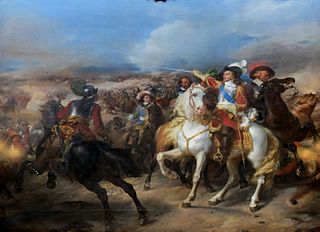
1648 (MDCXLVIII) was a leap year starting on Wednesday of the Gregorian calendar and a leap year starting on Saturday of the Julian calendar, the 1648th year of the Common Era (CE) and Anno Domini (AD) designations, the 648th year of the 2nd millennium, the 48th year of the 17th century, and the 9th year of the 1640s decade. As of the start of 1648, the Gregorian calendar was 10 days ahead of the Julian calendar, which remained in localized use until 1923.
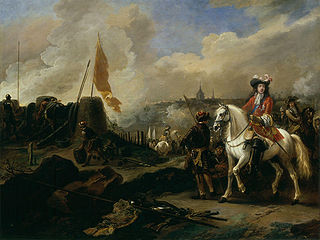
1685 (MDCLXXXV) was a common year starting on Monday of the Gregorian calendar and a common year starting on Thursday of the Julian calendar, the 1685th year of the Common Era (CE) and Anno Domini (AD) designations, the 685th year of the 2nd millennium, the 85th year of the 17th century, and the 6th year of the 1680s decade. As of the start of 1685, the Gregorian calendar was 10 days ahead of the Julian calendar, which remained in localized use until 1923.
The 1710s decade ran from January 1, 1710 to December 31, 1719.

1738 (MDCCXXXVIII) was a common year starting on Wednesday of the Gregorian calendar and a common year starting on Sunday of the Julian calendar, the 1738th year of the Common Era (CE) and Anno Domini (AD) designations, the 738th year of the 2nd millennium, the 38th year of the 18th century, and the 9th year of the 1730s decade. As of the start of 1738, the Gregorian calendar was 11 days ahead of the Julian calendar, which remained in localized use until 1923.

1659 (MDCLIX) was a common year starting on Wednesday of the Gregorian calendar and a common year starting on Saturday of the Julian calendar, the 1659th year of the Common Era (CE) and Anno Domini (AD) designations, the 659th year of the 2nd millennium, the 59th year of the 17th century, and the 10th and last year of the 1650s decade. As of the start of 1659, the Gregorian calendar was 10 days ahead of the Julian calendar, which remained in localized use until 1923.
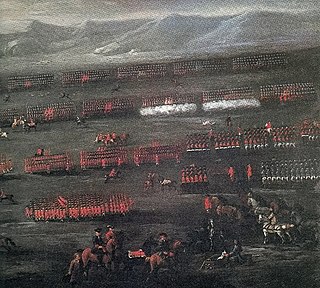
1715 (MDCCXV) was a common year starting on Tuesday of the Gregorian calendar and a common year starting on Saturday of the Julian calendar, the 1715th year of the Common Era (CE) and Anno Domini (AD) designations, the 715th year of the 2nd millennium, the 15th year of the 18th century, and the 6th year of the 1710s decade. As of the start of 1715, the Gregorian calendar was 11 days ahead of the Julian calendar, which remained in localized use until 1923.

1686 (MDCLXXXVI) was a common year starting on Tuesday of the Gregorian calendar and a common year starting on Friday of the Julian calendar, the 1686th year of the Common Era (CE) and Anno Domini (AD) designations, the 686th year of the 2nd millennium, the 86th year of the 17th century, and the 7th year of the 1680s decade. As of the start of 1686, the Gregorian calendar was 10 days ahead of the Julian calendar, which remained in localized use until 1923.

The House of Bourbon is a European dynasty of French origin, a branch of the Capetian dynasty, the royal House of France. Bourbon kings first ruled France and Navarre in the 16th century. By the 18th century, members of the Spanish Bourbon dynasty held thrones in Spain, Naples, Sicily, and Parma. Spain and Luxembourg have monarchs of the House of Bourbon.

The Kingdom of France in the early modern period, from the Renaissance to the Revolution (1789–1804), was a monarchy ruled by the House of Bourbon. This corresponds to the so-called Ancien Régime. The territory of France during this period increased until it included essentially the extent of the modern country, and it also included the territories of the first French colonial empire overseas.

The Kingdom of France is the historiographical name or umbrella term given to various political entities of France in the medieval and early modern period. It was among the most powerful states in Europe and a great power from the High Middle Ages onward. It was also an early colonial power, with possessions around the world.
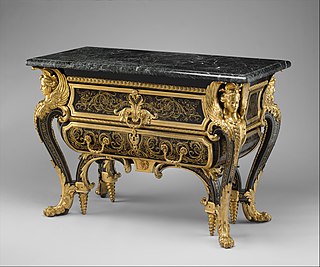
André-Charles Boulle, le joailler du meuble, became the most famous French cabinetmaker and the preeminent artist in the field of marquetry, also known as "inlay". Boulle was "the most remarkable of all French cabinetmakers". Jean-Baptiste Colbert recommended him to Louis XIV of France, the "Sun King", as "the most skilled craftsman in his profession". Over the centuries since his death, his name and that of his family has become associated with the art he perfected, the inlay of tortoiseshell, brass and pewter into ebony. It has become known as Boulle Work, and the École Boulle, a college of fine arts and crafts and applied arts in Paris, continues today to bear testimony to his enduring art, the art of inlay.

Antoine Court was a French reformer called the "Restorer of Protestantism in France." He was born in Villeneuve-de-Berg, in Languedoc, on 27 March 1696. His parents were peasants, adherents of the Reformed church, which was then undergoing persecution. When 17 years old, Court began to speak at the secret meetings of the Protestants, held literally "in dens and caves of the earth," and often in darkness, with no pastor present to teach or counsel.
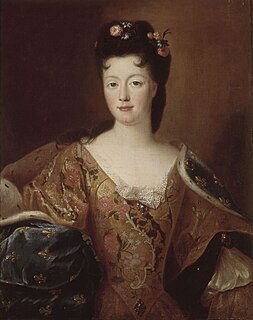
Élisabeth Charlotte d'Orléans was a petite-fille de France, and Duchess of Lorraine and Bar by marriage to Leopold, Duke of Lorraine. She was regent of Lorraine and Bar during the minority (1729–1730) and absence of her son (1730–1737), and suo jure Princess of Commercy 1737–1744. Among her children was Francis I, Holy Roman Emperor, a co-founder of the royal House of Habsburg-Lorraine.
Events from the year 1701 in France.
Events from the year 1653 in France.
Events from the year 1638 in France.
Events from the year 1660 in France
Events from the year 1657 in France
Events from the year 1593 in France